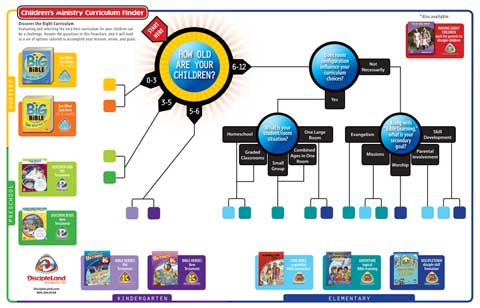Selecting the very best curriculum for children is a pivotal and challenging task—a decision to be bathed in prayer and filtered through God’s Word. As you begin this process, think about God’s overarching purpose of Christian education: “What is God’s goal for your children?” “What does He want them to become?”
Jesus commanded His followers to “make disciples of all the nations, baptizing them in the name of the Father and the Son and the Holy Spirit, teaching them to observe all that I commanded you” (Matthew 28:19-20). Is anything more important than teaching children to know God intimately, to love Him passionately, and to serve Him selflessly?
Choosing a discipleship curriculum may not be easy, but making wise decisions about your curriculum will impact generations to come.
Begin when they are young
Making disciples is most effective when you begin with children. Rick Warren writes, “Discipleship is the process of transformation that changes us to be increasingly more like Christ through the Word (John 17:17), the Spirit (2 Cor. 3:18), and circumstance (Rom. 8:28-29) … It takes far more than Bible study to grow a disciple – it takes a balance of worship experiences, fellowship experiences, engagement with the Word, ministry experiences, and evangelism/mission experiences.” Warren explains that discipleship should be a process that “…moves people along the predictable stages of discipleship from unbeliever to believer to member to maturity to ministry to mission, based on Jesus’ model. If you don’t have a process, you aren’t making disciples, because spiritual growth is not automatic. Discipleship is intentional, incremental, relational, covenantal, habitual, and incarnational.”1
10 keys to help you evaluate any curriculum
1. Bible engagement
Does the curriculum encourage children to use their own Bibles?
• Kids need to become self-feeders—to develop the ability to open their Bibles and learn what God has to say directly to them.
2. Relational bonding
Does the curriculum encourage healthy inter-generational and peer relationships?
• Kids need adult mentors and trustworthy role models who believe in and understand them.
3. Global perspective
Does the curriculum provide opportunities to learn what God is doing around the world?
• Kids need to lift their eyes from themselves and find ways to serve the needs of others.
4. Teacher-friendly
Do the Teacher Guides provide easy-to-follow lesson plans with creative activity ideas?
• Teachers who feel confident and excited about the lesson will motivate learners to embrace Biblical truths.
5. Life-change
Does the curriculum encourage genuine life-transformation opportunities?
• Kids need to hear the Gospel and respond to Jesus’ call to be His disciples.
6. Church compatibility
Does the curriculum dovetail with your church’s core values and overall direction?
• Leaders need to see how the children’s ministries complement the mission of the entire church.
7. Scope & sequence
Does the curriculum follow a clear plan that ensures your children will receive balanced spiritual growth?
Kids need exposure to:
- Sequential Bible Instruction (OT and NT book studies)
- Skill Formation (practical “how-to” life skills)
- Missions Training (Great Commission, cultural studies)
- Topical Bible Instruction (doctrine, character, etc.)
8. Culturally relevant
Does the curriculum speak to “where children are” in life?
• Kids need to see how the Bible offers wisdom for making good decisions, relates to their needs, and addresses their concerns.
9. Developmentally appropriate
Does the curriculum provide clear learning objectives for each lesson?
• Teachers need to help kids grow in Bible knowledge (mental/cognitive), PLUS Christ-like character (emotional/affective), PLUS godly conduct (behavioral/psycho-motor).
10. Church + home
Does the curriculum suggest practical ways parents can become involved in the spiritual growth of their children?
• Kids need dads and moms who encourage and reinforce what they are learning at church.
Current research confirms that culture greatly influences children’s moral behavior and development. Unfortunately, the vast majority of Christian kids today have inadequate spiritual foundations. Fun and games are fine, but the research indicates that we’ve raised a generation of children who have missed out on essential Bible training. When the world comes calling, many are falling prey to dubious activities and deceptive philosophies—and they are walking away from their faith.
Selecting the right curriculum
“By the age of nine, most of the moral and spiritual foundations of a child are in place,” writes George Barna.2 Begin now to come alongside parents and equip them to provide children with biblical principles that will protect them from a barrage of worldly ideas that are hostile to a Christian worldview.
In light of Jesus’ mandate to make disciples, choose curriculum that is intentional, relational, and transformational. Look for curriculum designed to help children know God intimately, love Him passionately, and serve Him selflessly.
Download: Curriculum Chart
————-
1 Rick Warren. Definition of Discipleship. Exponential. Web 2012.
2 George Barna. Research Shows That Spiritual Maturity Process Should Start at a Young Age. Web 2014. Barna.org










I whole heartedly agree!
Thanks for the Children’s Ministry Curriculum Finder. I will be showing it to some people in our area churches. It is really helpful!
thank you./ im excited. love donise